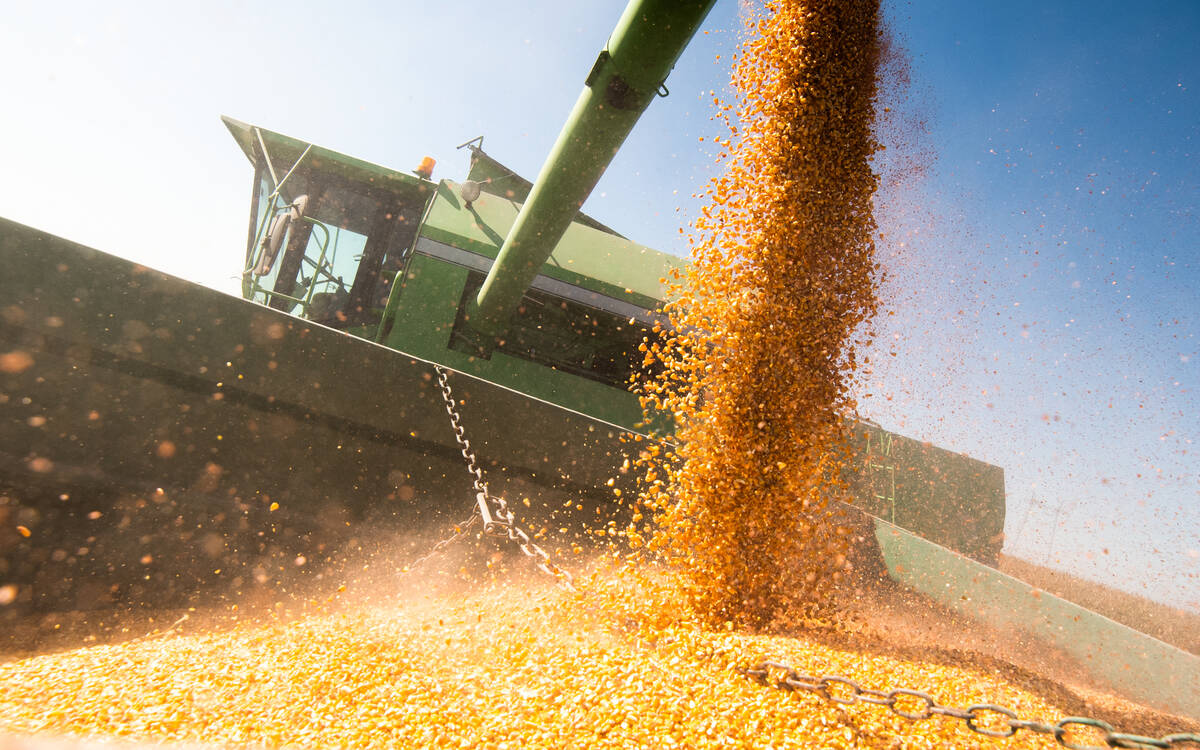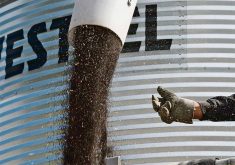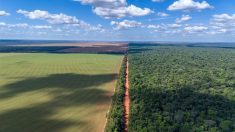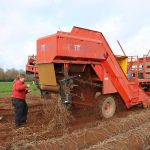Agribusiness giant Bunge and the Saudi Arabian government’s ag investment arm are the joint “successful acquirer” of the former Canadian Wheat Board.
Bunge Canada and SALIC Canada, an arm of the Saudi Agricultural and Livestock Investment Co., on Wednesday announced their new Winnipeg-based joint venture, G3 Global Grain Group, will pay $250 million to CWB for 50.1 per cent ownership.
The remaining 49.9 per cent will be held by a trust, managed by three independent trustees of CWB’s choosing, with units in the trust to be held by farmers delivering to CWB, as per its Farmer Equity Plan announced in 2013. [Related story]
Read Also

Feed Grain Weekly: Corn affecting barley prices in Lethbridge
Corn imports entering Lethbridge have lowered prices for feed barley compared to those in Edmonton.
G3, under the terms of its deal, will have the option to acquire the trust’s stake at “fair market value” in seven years’ time.
G3’s deal already has approval from Industry Canada but awaits clearance from the federal Competition Bureau, federal Agriculture Minister Gerry Ritz said Wednesday at a press conference in Winnipeg announcing the deal.
Karl Gerrand, managing director of Bunge’s Canadian business and the new CEO for G3, said his “best guess” is that the deal will close in early July.
From Ritz’s perspective, the deal for a new ownership structure in CWB means the government has “fully delivered on the commitments we made” when it legislated an end to the Canadian Wheat Board’s single marketing desk for Prairie wheat and barley in 2012.
CWB, he said, will finally be “off the government’s books.”
Federal opposition New Democrats, however, described the deal as “outrageous,” noting farmers’ stake in CWB “can be revoked completely in seven years at the sole discretion of the new majority owners.”
“The CWB built a global reputation because of the hard work and investments by Canadian farmers,” Winnipeg NDP MP Pat Martin said in a release Wednesday. “After dismissing a bid directly from Canadian farmers, the Conservatives have handed over majority control of one of Canada’s largest global players on a silver platter to foreign ownership.”
Best known as the “B” in the four “ABCD” companies leading global grain trade, U.S.-based Bunge has over 800 employees in Canada across its oilseed crushing and refining, packaging, grain handling and terminal operations, but is a relatively small player in Prairie grain handling.
G3’s minority partner, SALIC, was set up by the Saudi Arabian government in late 2011 with the goal of “ensuring abundant food supply for people in Saudi Arabia as well as resolving (the) global food crisis, by carrying out mass production projects with the support of other countries.”
“SALIC is committed to infrastructure investment in countries such as Canada, which are exporters of surplus supplies of high-quality grain,” SALIC chairman Abdullah Al-Rubaian said in G3’s release.
“The launch of G3 will enable us to invest in infrastructure across Canada, providing more market choices for Canadian producers.”
“We’re here today because we believe the world needs better access to Canadian grain,” Gerrand said at Wednesday’s event, but noted Bunge and SALIC, by themselves, will still have to compete with other buyers for CWB’s grain.
Gerrand — who previously led Can-Oat Milling, now owned by Richardson International, and later served as an executive at Saskatchewan Wheat Pool and Viterra before moving to Bunge in 2013 — said he’s been through “a number of transactions similar to this” and G3 “had to be very aggressive in order to win this bid.”
The choice of G3 as CWB’s majority owner came through a selection process in which it was chosen from “over 50 potential investors,” CWB CEO Ian White said at the same event.
The successful player had to bring capital not just for CWB’s current needs but going forward, and had to have a presence in the global agribusiness arena, he said.
CWB also sought an investor that appreciates the importance of farmers in CWB’s history and has experience in aspects of the grain industry where CWB’s own bench strength is limited.
G3, White said, met those criteria and added the “significant benefit” of introducing a relatively new competitor in the Canadian grain industry arena.
“We didn’t want a company that already had a significant Canadian footprint,” CWB chief strategy officer Dayna Spiring said, as the company wanted to see continued competition in the Prairie grain sector — and keep CWB’s current staff on board.
“Potential for development”
Gerrand said G3 is “looking forward to working with Ian (White) and his team,” but CWB made clear in a separate release Wednesday that White will remain with the company until the deal closes “and for a period of time thereafter, to ensure a successful transition period.”
G3, Gerrand said, today consists of “a staff of 12, sitting in an office of eight” and thus will relocate its head office staff to the CWB’s leased space at the building it previously owned in downtown Winnipeg.
That said, CWB will continue to operate under the CWB name, and G3 has “no intention” of rebranding CWB at this time, he added. CWB’s new leadership structure will include a still-unnamed seven-member board of directors, among them one of the three still-unnamed trustees representing farmers’ equity stake.
CWB’s pooling activities for wheat, barley and canola will also continue for those farmers interested in pooling, White said. G3 also sees pooling as a “very valuable” option for farmers delivering to CWB going forward, Gerrand added.
Gerrand also said G3 aims to explore ways to reduce rail backlogs and shipping delays for Prairie grain.
A relatively small player in Prairie grain handling infrastructure, CWB has no port terminal space on Canada’s West Coast, but has throughput agreements with Prairie grain handlers who do — and G3 also sees “potential for development” at the West Coast, he said.
CWB’s own handling assets include those it bought from Mission Terminal, Prairie West Terminal and Great Sandhills Terminal, as well as port facilities at Thunder Bay and Trois-Rivieres, a pair of laker vessels and four other Prairie elevators now under construction in Manitoba and Saskatchewan.
Grain Growers of Canada, in a separate release Wednesday, said the added funds from G3 “will allow CWB to fully transition to a private commercial enterprise and allow them to better serve their customers.” — AGCanada.com Network
















